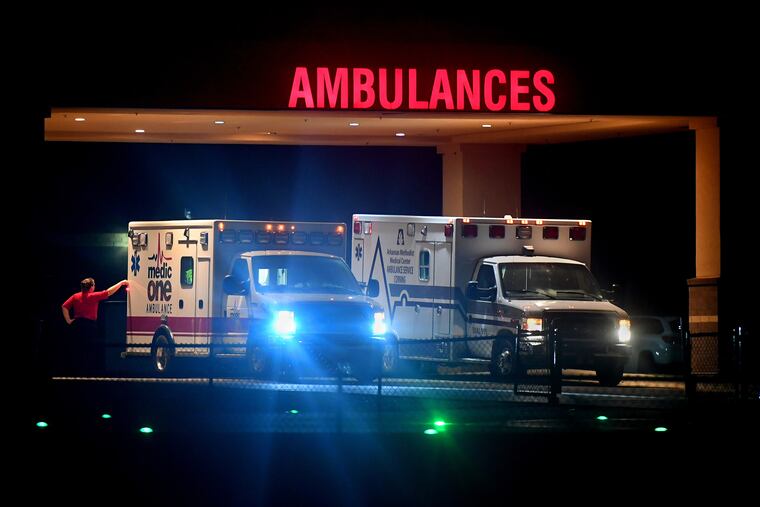Surprise ambulance bills are painful. This bill could make it worse l Opinion
When people call for an ambulance, there is rarely time to think about what the ride may cost them or to figure out whether the ambulance is in their insurance network.

In the early 2000s, a Bucks County man was diagnosed with a neurological disease that affected his movement, slowed his cognitive function and vision. One day, after a fall, the man needed emergency transportation from a rehab facility to a medical specialist, a trip that required an ambulance due to his condition. Despite his excellent health coverage, he and his wife received a bill for hundreds of dollars for that short ride.
A medical emergency or an injury is scary enough, and when people call for an ambulance, there is rarely time to think about what the ride may cost them or to figure out whether the ambulance is in their insurance network.
Yet, out-of-network ambulance rides are shockingly common. In a 2017 study in Health Affairs, 51% of ambulance rides studied nationally were out-of-network, and half of those resulted in bills for out-of-network services. These bills – called surprise medical bills – can range from hundreds to even thousands of dollars, and, according to the study, ambulance rides are the most common reason for surprise medical bills when patients access emergency care.
These bills can place significant stress on families and individuals. A 2016 Federal Reserve study found that 44% of U.S. households cannot pay an emergency expense of $400 or more without borrowing or selling some of their possessions.
The prevalence of expensive surprise bills resulting from ambulance rides is not just financially devastating; it can be life-threatening if patients opt not to call an ambulance because they are concerned about costs.
As Heather, one of many patients who have contacted us at the Pennsylvania Health Access Network about this issue put it, “I am a 40-year-old asthmatic with anaphylactic food allergy reactions. There are times when I’ve been close to passing out when I refused to call an ambulance because of the risk of financially being dragged under. Someday, I’m going to push my luck, and I may die. It sure feels like a hopeless situation.”
This hesitance to access needed medical services is only growing. A 2018 study of Pennsylvania adults by the Healthcare Value Hub showed that affordability concerns, such as surprise medical bills, mean that a high number of adult Pennsylvanians choose to delay care (29%) or avoid care entirely (25%).
Pennsylvania currently has some limited protections in place for those who need to use an ambulance. Under our existing law — in certain cases — health insurers pay the in-network rate to settle the bill with the ambulance provider even if the provider is out-of-network, and patients cannot be billed for additional out-of-network charges. This particular protection only applies to certain ambulance providers who are paid directly by insurers.
But, lawmakers in Harrisburg are considering doing away with even this limited protection, even as they are simultaneously considering much-needed legislation that would create more consumer protections for the 1 in 3 Pennsylvanians who receive surprise medical bills each year. House Bill 1347 would eliminate the prohibition against surprise balance billing for certain ambulance rides.
The rate of Pennsylvanians receiving surprise medical bills aligns with national trends, and public pressure is growing for lawmakers to take action on these bills. Importantly, however, proposed federal legislation on surprise medical bills does not address ambulance rides.
It is therefore critical that the Pennsylvania General Assembly maintain the protections that healthcare consumers currently have against surprise ambulance bills. While lawmakers in Harrisburg should certainly address the need for additional funds to ensure ambulance companies receive appropriate funds to provide emergency medical transportation and maintain readiness to respond to calls, the burden of cost should not be returned to consumers.
Legislators in Harrisburg should work to strengthen overall consumer protections for patients when it comes to surprise medical bills, not to erode the few that consumers already have.
Antoinette Kraus is director of the Pennsylvania Health Access Network, the state’s largest statewide health coalition, and is a member of the Inquirer’s Health Advisory Panel.